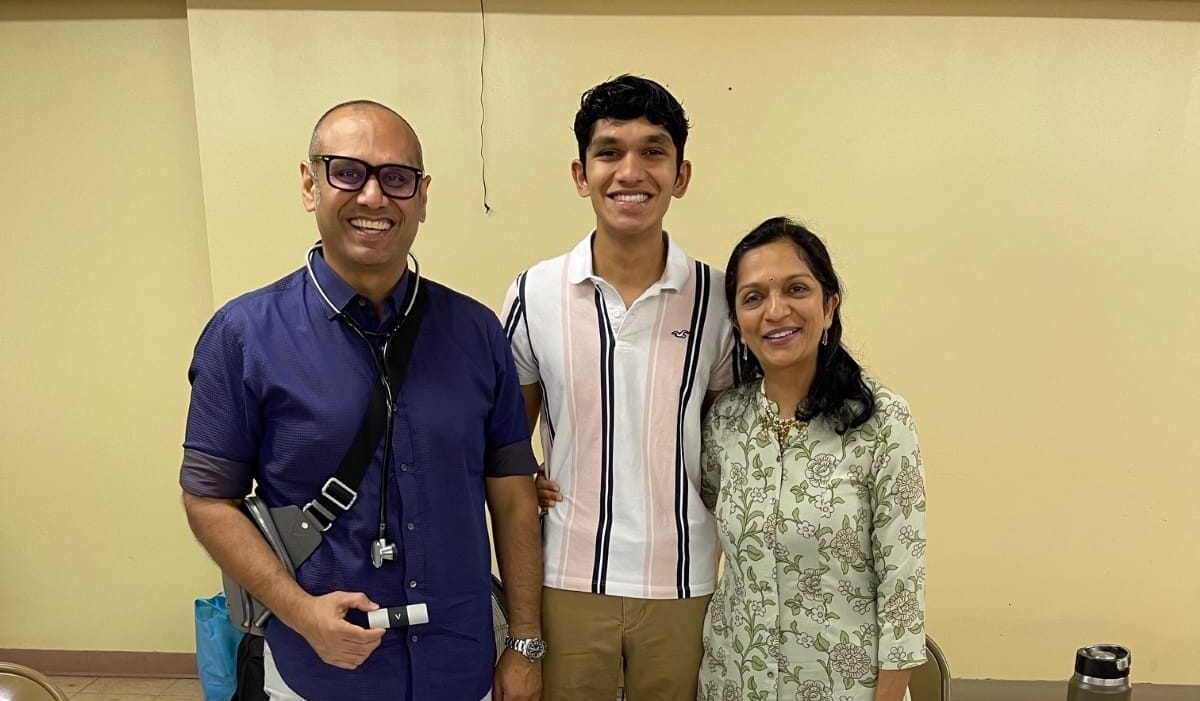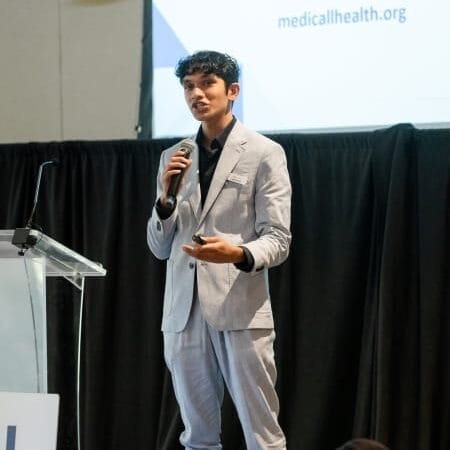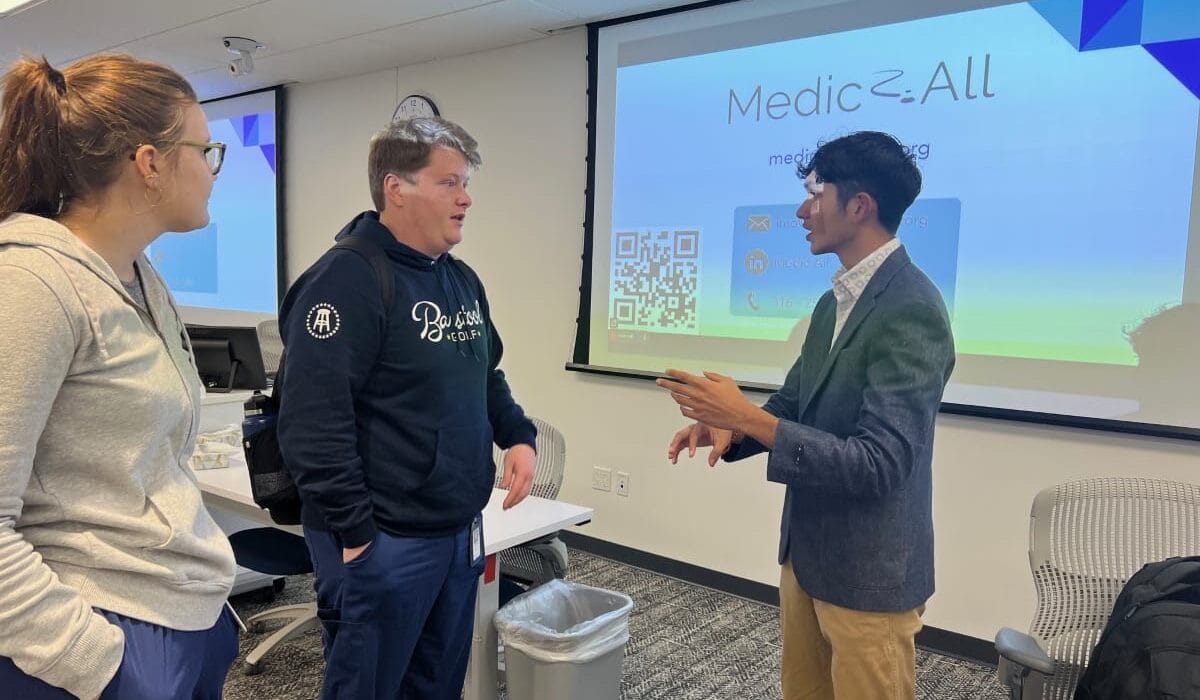Kansas Teen Works to Make Healthcare Accessible

Meet Daily Point of Light Award honoree Ayaan Parikh. Read his story, and nominate an outstanding volunteer or family as a Daily Point of Light.
Newly graduated from high school, Ayaan Parikh is driven by curiosity. He plays the violin (with a Western-style musical education) and enjoys combining that with Indian classical singing, which is more improvisation-based. The contrast between the two is beautiful and challenging, much like his volunteer work as the founder and executive director of Medic All, which strives to navigate a healthcare system that does not adequately serve the needs of everyone.
Medic All is a 501(c)3-status organization that offers free mental and physical telehealth healthcare consultations for low-income patients who otherwise have little or no access to the healthcare system. Telehealth uses technology to facilitate appointments with medical professionals without actually visiting a clinic. Medic All healthcare professionals donate their time to helping the underserved of Kansas. They consist of MDs, PAs, RNs and medical students. The service is extremely valuable for patients who are not currently insured or don’t have a primary doctor. However, Medic All serves any Kansas resident within 200% of the federal poverty line.
As he enters Stanford University this fall, Ayaan plans on continuing with Medic All, but this time with a focus on growth, and less “boots on the ground.”
What inspires you to volunteer?
I have been interested in health equity and community development since 9th grade, when I discovered the glaring disparity in the accessibility and quality of healthcare between the poor and the wealthy.

In 9th grade, I had the opportunity to shadow the director of a free clinic in Wichita, Kansas. I had read a book called The Physics of Future which talked about the future of technology and its impact on everyday life. As I was reading about medicine, the book discussed telehealth as a way to create healthcare accessibility. I became interested in researching this topic. I found that although telehealth is being used throughout the healthcare system, it is only at a privatized level. It is not used to increase healthcare accessibility in the low-income sector. I thought it would be interesting to meet with one of the directors of the free clinic and talk about telehealth. This is when I became attuned to the challenges of certain individuals in accessing healthcare.
I look for answers to the question, “What can we do to expand the healthcare system to ensure that all people have the right, access and privilege to healthcare?” I understand that changing a healthcare system this big seems impossible, but I believe we can chip away at the negatives and build up the positives. I regularly ask myself, “How big of an impact can I have by making small changes?”
Tell us about your volunteer role with Medic All.
I am the founder and executive director of Medic All. I have assembled a Board of Directors and Board of Advisors composed of doctors, hospital presidents, healthcare technology specialists, nurses, medical students and other community leaders.
I typically work five to six hours a week with Medic All. I am constantly seeking new partnerships with healthcare professionals, hospitals, labs, community centers and shelters for unhoused individuals to provide a seamless entry into the healthcare system for underserved individuals and families. We administer their first telehealth consultation, at which point our clients are given a path forward. For example, we may make appointments for blood work, or refer them to specialists if their problem cannot be solved in a telehealth meeting.
I am also in charge of fundraising, securing grants and developing our revenue model. One of our key revenue sources is white labeling our software. We sell software licenses to organizations that also serve low-income individuals so they can hit the ground running without taking valuable time to develop software.
We are also finding ways to work with insurance companies, which is a win-win because they can save a lot of money when patients do telehealth, and patients can get quality care.
Today, the Medic All platform has many clients who receive free healthcare and a continuity-of-care plan. The continuity-of-care plan is developed during the initial telehealth consultation. Each patient’s medical report includes diagnostics, general instructions and future steps. There is also a follow-up meeting in three to six months to ensure continuity of care.
We offer telehealth consultations in general health check-ups, mental health, symptom-based care and fitness and health. This comprehensive approach is often missing when low-income individuals need to improve their overall health and well-being.
What are your long-term plans or goals for Medic All?
My goal is to continue expanding Medic All outside of Kansas, first throughout the Midwest, and then nationwide and hopefully worldwide. The goal is to scale it once we can show that it works effectively on a relatively small scale like Kansas.

What’s been the most rewarding part of your work?
I have very few opportunities to speak to our clients and hear their stories, but when I do, it is easily the most rewarding part. One client told me, “I thought there was no way for me to get any medical care. I haven’t seen a doctor since I was 15, but because of this platform I could meet with a doctor.”
What have you learned through your experiences as a volunteer?
One of the most important lessons has been the importance of networking and learning from people who have a lot more experience than you. I started Medic All in 9th grade, so I had very limited knowledge. Just a lot of passion. The most valuable thing was talking to people who knew what the problem was and could offer solutions.
Any advice for people who want to start volunteering?
Try to understand the problem. When you see a problem, research it and see what you can do and what organizations are involved. Speak to people who are using a service in addition to the people who created the service. Knowing the larger purpose of your volunteer efforts will fuel your motivation to do all these things.
What do you want people to learn from your story?
When I was creating Medic All, there were many times I hesitated and wondered if I should continue. I had to overcome a lot of doubts. Most importantly, start. If you have an idea, don’t overthink it. Talk to people. Talk to potential partners, experts, organizations and users and understand the problem deeply before you jump in with a solution. You can evolve as you grow. The first step is the hardest!
Do you want to make a difference in your community like Ayaan? Find local volunteer opportunities.
